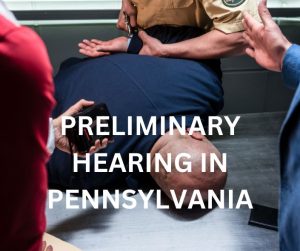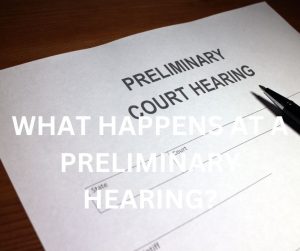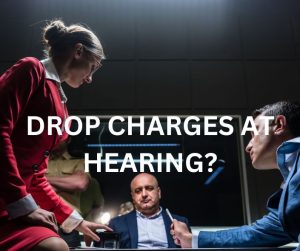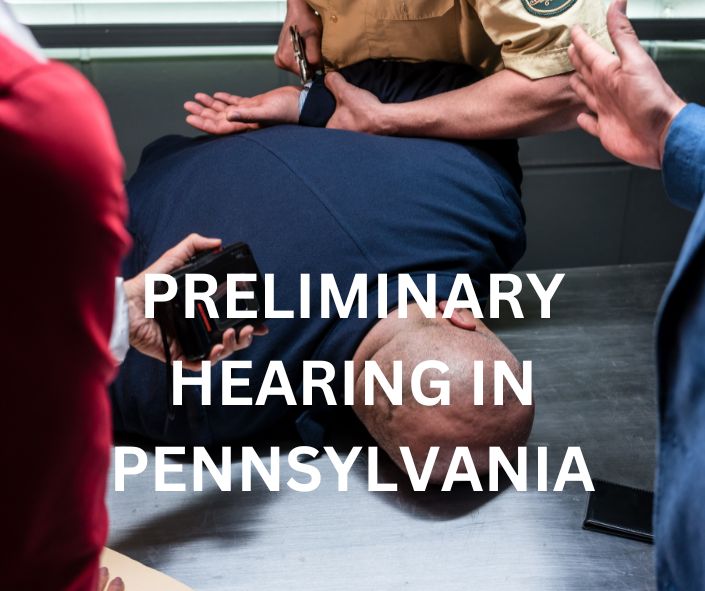The preliminary hearing is a crucial stage in the criminal justice process in Pennsylvania. It’s not a trial, but rather a chance for the prosecution to present evidence and witnesses to a judge, who will then decide if there’s enough evidence to proceed to trial.
Purpose of the Preliminary Hearing
The main goal of this hearing is to determine if there’s sufficient evidence to believe a crime was committed and that the accused person did it. If the judge believes there’s enough evidence, the case moves forward. If not, the charges can be dismissed.
What Happens During the Hearing
 Prosecution’s Presentation: The prosecution presents its evidence, which can include witness testimonies, physical evidence, and more.
Prosecution’s Presentation: The prosecution presents its evidence, which can include witness testimonies, physical evidence, and more.- Defense’s Opportunity: The defense can cross-examine the prosecution’s witnesses, challenge evidence, and even present its own evidence or witnesses.
- Judge’s Decision: After hearing both sides, the judge decides whether there’s enough evidence to proceed.
Can You Go To Jail At A Preliminary Hearing?
A preliminary hearing is a procedural step in the criminal justice process, and its primary purpose is to determine whether there is enough evidence to proceed to trial. Here’s what you need to know about the possibility of going to jail at a preliminary hearing:
- Not a Trial: A preliminary hearing is not a trial. It’s a hearing where the prosecution presents evidence to a judge to show that there is probable cause to believe a crime was committed and that the accused committed it.
- No Verdict: Since it’s not a trial, there is no verdict of guilt or innocence at a preliminary hearing. Therefore, you cannot be sentenced to jail based on the outcome of the hearing itself.
- Existing Custody Status: If you were already in custody (jail) before the preliminary hearing, you might remain in custody after the hearing, especially if the judge determines there is enough evidence to proceed to trial. If you were out on bail or released on your own recognizance, you would typically remain out of custody unless new circumstances arise that change your bail status.
- Bail Considerations: In some jurisdictions, the preliminary hearing can also serve as a time for bail considerations. If the judge believes there’s a risk of the accused not appearing for future court dates or poses a danger to the community, they might revoke or increase bail, which could result in the accused being taken into custody.
- Legal Representation: It’s crucial to have legal representation during a preliminary hearing. A defense attorney can argue against the evidence presented by the prosecution, potentially leading to the charges being dismissed or reduced. They can also advocate for favorable bail conditions.
In summary, while you won’t be sentenced to jail based on the outcome of a preliminary hearing, there are circumstances under which you might end up in custody, such as changes to bail conditions. Always consult with a legal professional about the specifics of your case.
Possible Outcomes
- Held for Court: If the judge believes there’s enough evidence, the case is “held for court,” meaning it will proceed to trial.
- Dismissal: If the judge doesn’t find sufficient evidence, the charges can be dismissed.
- Reduction of Charges: Sometimes, the judge may decide to reduce the charges based on the evidence presented.
What Happens At A Preliminary Hearing For A Felony Crime?
 A preliminary hearing for a felony is a crucial step in the criminal justice process. Here’s a breakdown of what typically happens during such a hearing:
A preliminary hearing for a felony is a crucial step in the criminal justice process. Here’s a breakdown of what typically happens during such a hearing:
- Purpose of the Hearing: The primary purpose of a preliminary hearing is to determine whether there’s enough evidence (probable cause) to believe a felony crime was committed and that the accused person committed it.
- Prosecution’s Presentation: The prosecution, usually represented by a district attorney or another prosecutor, presents evidence to a judge. This evidence can include:
- Witness Testimonies: Witnesses may be called to testify about what they saw, heard, or know regarding the alleged crime.
- Physical Evidence: Items such as weapons, photographs, documents, or other relevant materials may be presented.
- Police Reports: Officers involved in the arrest or investigation might provide their accounts.
- Defense’s Opportunity: The defense, represented by a defense attorney, has the chance to:
- Cross-Examine Witnesses: The defense can question the prosecution’s witnesses to challenge their credibility or the accuracy of their testimonies.
- Present Evidence: While less common, the defense can present its own evidence or witnesses to counter the prosecution’s claims.
- Argue Legal Points: The defense might argue that certain evidence should be excluded or that the charges should be dismissed due to legal reasons.
- Judge’s Decision: After hearing both sides, the judge will make one of the following decisions:
- Held for Court: If the judge determines there’s enough evidence, the case is “held for court,” meaning it will proceed to trial.
- Dismissal: If the judge finds that there’s not enough evidence or that the evidence presented doesn’t support the charges, the charges can be dismissed.
- Reduction of Charges: In some cases, the judge might decide that while there’s not enough evidence for a felony, there might be enough for a lesser charge, such as a misdemeanor.
- No Verdict: It’s important to note that a preliminary hearing is not a trial. There’s no verdict of guilt or innocence at this stage. It’s solely about determining whether there’s enough evidence to proceed to trial.
- Next Steps: If the case is held for court, the next steps might include formal arraignment, pre-trial conferences, and eventually, a trial.
Having legal representation during a preliminary hearing is crucial, as the outcome can significantly impact the course of the case.
Can Charges Be Dropped At A Preliminary Hearing?
Yes, charges can be dropped at a preliminary hearing. Here’s how and why this might happen:
- Insufficient Evidence: The primary purpose of a preliminary hearing is for the prosecution to demonstrate to the court that there is probable cause to believe a crime was committed and that the accused person committed it. If the prosecution fails to meet this burden of proof, the judge may dismiss the charges.
- Credibility of Witnesses: If the defense effectively cross-examines the prosecution’s witnesses and casts doubt on their credibility or the accuracy of their testimonies, the judge might find that there’s not enough reliable evidence to proceed.
- Exclusion of Evidence: If the defense successfully argues that certain evidence should be excluded (e.g., because it was obtained illegally), and that evidence is crucial to the prosecution’s case, the charges might be dropped.
- Prosecutor’s Discretion: In some cases, the prosecutor might decide to drop the charges during or after the preliminary hearing. This could be due to various reasons, such as new evidence coming to light, a key witness becoming unavailable, or the prosecutor determining that it’s not in the interest of justice to proceed.
- Reduction of Charges: While not a complete dismissal, sometimes charges might be reduced at a preliminary hearing. For instance, a felony charge might be reduced to a misdemeanor based on the evidence presented.
- Negotiations: In some cases, the defense and prosecution might negotiate a plea deal or other agreement that results in charges being dropped or reduced.
It’s important to note that even if charges are dropped at the preliminary hearing, it doesn’t necessarily mean the accused is free from legal jeopardy. The prosecution might refile charges later if new evidence emerges or decide to proceed with different charges.
Having legal representation during a preliminary hearing is crucial, as a skilled defense attorney can advocate for the dismissal or reduction of charges and ensure the accused person’s rights are protected.
What Does “Held For Court” Mean In A Preliminary Hearing?
 “Held for court” is a legal term used in the criminal justice system, particularly during preliminary hearings. Here’s what it means:
“Held for court” is a legal term used in the criminal justice system, particularly during preliminary hearings. Here’s what it means:
- Determination After Preliminary Hearing: After a preliminary hearing, if the judge determines that there is sufficient evidence (probable cause) to believe a crime was committed and that the accused person committed it, the case is “held for court.”
- Proceeding to Trial: When a case is “held for court,” it means that the case will proceed to the next stages of the criminal justice process, which may include a formal arraignment, pre-trial conferences, and eventually, a trial.
- Not a Verdict: It’s important to note that being “held for court” is not a verdict of guilt or innocence. It simply means that there’s enough evidence for the case to move forward to trial or the next procedural steps.
- Importance of Legal Representation: If a case is held for court, it’s crucial for the accused to have legal representation, as the stakes become higher. A defense attorney can help navigate the complexities of the trial process, advocate for the accused, and work towards the best possible outcome.
In summary, “held for court” indicates that a case has met the threshold of evidence required at the preliminary hearing stage and will proceed further in the criminal justice system.
What Is The Burden Of Proof Required At A Preliminary hearing?
The burden of proof required at a preliminary hearing is “probable cause.” Here’s what that means:
- Probable Cause Defined: Probable cause is a standard of proof that requires the prosecution to show that there is a reasonable basis to believe two main things:
- A crime was committed.
- The accused person committed that crime.
- Not as High as “Beyond a Reasonable Doubt”: The probable cause standard is lower than the “beyond a reasonable doubt” standard required for a conviction at trial. It’s more than mere suspicion but doesn’t require absolute certainty.
- Purpose of the Standard: The probable cause standard is used at the preliminary hearing to ensure that there is a legitimate basis for pursuing criminal charges and taking the case to trial. It acts as a safeguard against baseless accusations.
- Judge’s Role: At the preliminary hearing, the judge evaluates the evidence presented by the prosecution to determine whether it meets the probable cause standard. If the judge believes there is probable cause, the case will be “held for court” and proceed to the next stages of the criminal justice process. If not, the charges may be dismissed.
- Types of Evidence Considered: Evidence that can be used to establish probable cause includes witness testimonies, physical evidence, police reports, and any other relevant information.
In summary, the burden of proof required at a preliminary hearing is to establish probable cause. It ensures that there is a reasonable basis for the charges and that the accused’s rights are protected against unwarranted prosecutions.
Importance of Legal Representation
Having a skilled defense attorney is crucial during the preliminary hearing. They can challenge the prosecution’s evidence, argue for the dismissal or reduction of charges, and ensure the accused person’s rights are protected.
Find Philadelphia Preliminary Hearing Lawyers
- Larry Krasner – Philadelphia District Attorney. He has been a leading civil rights attorney for over 25 years in Philadelphia. More about Larry Krasner
- Michael Coard – A renowned attorney known for his work in criminal defense and civil rights. More about Michael Coard
- Bradley Bridge – An attorney with the Defender Association of Philadelphia. He has been instrumental in challenging wrongful convictions. More about Bradley Bridge
- Keir Bradford-Grey – Chief Defender of the Defender Association of Philadelphia. She is known for her advocacy for criminal justice reform. More about Keir Bradford-Grey
- Lloyd Long – A criminal defense attorney in Philadelphia. He has a strong track record of defending clients in complex criminal cases. More about Lloyd Long
- Brian J. Zeiger – An experienced criminal defense attorney who has represented numerous clients in preliminary hearings and other legal proceedings. More about Brian J. Zeiger
- Richard L. Vanderslice – A dedicated attorney who specializes in criminal defense, real estate, and civil litigation. More about Richard L. Vanderslice
- A. Charles Peruto Jr. – A well-known criminal defense attorney in Philadelphia with decades of experience. More about A. Charles Peruto Jr.
- Evan Hughes – A top-rated criminal defense attorney known for his aggressive representation of clients. More about Evan Hughes
- William C. Brennan Jr. – A seasoned attorney with a focus on criminal defense and civil litigation. More about William C. Brennan Jr.
Please note that this list is based on the search results and may not be exhaustive. It’s always a good idea to do further research and consult with multiple attorneys before making a decision.
